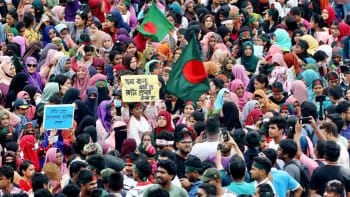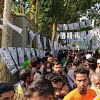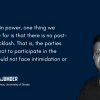An urgent plea for democracy

The ongoing protest by students and mass people demanding justice has surfaced in a profound democratic void in Bangladesh. The government's heavy-handed response to peaceful demonstrations reflects a deep-seated intolerance for dissent. Rather than engaging with the students' legitimate concerns, the administration chose to suppress their voices, further exacerbating the democratic deficit.
Over the past 15 years, the ruling party has systematically eroded the democratic fabric of the nation, leading to widespread discontent and disillusionment among the populace. For the past decade and a half, Bangladesh has witnessed a systematic de-democratisation process orchestrated by the ruling party. This process has involved manipulating democratic institutions, undermining free and fair elections, and consolidating power through various means. The ruling party has effectively used blame games and the rhetoric of development to mask its authoritarian tendencies, creating an illusion of progress while stifling democratic freedoms.
The last three elections have been marred by allegations of irregularities and manipulation, distancing the ruling party from the electorate. These questionable elections have not only undermined the democratic process but also alienated the party's leaders from the people. The gap between the government and the governed has widened, resulting in a significant disengagement that has eroded public trust in the political system. The creation of a parliament with a one-sided election that does not heed the demands of the society, but benefits a select group has further entrenched this de-democratisation. The systematic interference in the legal system has undermined the rule of law, eroding the foundational principles of democracy and justice.
Surprisingly, the identity of a portion of civil society has become blurred as they aligned themselves with the ruling party and adopted behaviours and rhetoric that echo the government's stance. This co-optation of civil society further stifles independent voices and critical discourse, contributing to the democratic erosion. The parties not in power have also drastically failed the nation by ignoring the real challenges faced by the masses. Their focus has been primarily on regaining power rather than addressing the pressing issues that affect the everyday lives of the people. This neglect has further contributed to the democratic void and the growing disillusionment among citizens.
To address this democratic crisis, it is imperative for the ruling party to cultivate a culture of democracy within its ranks. This includes encouraging and allowing opposing voices, ensuring freedom of speech, and using administrative apparatus for the benefit of citizens rather than for maintaining power. Free and independent media is vital for a functioning democracy, and steps must be taken to ensure that media outlets can operate without fear of repression or censorship. Listening to opposing voices with good intentions and understanding that protesters are citizens of Bangladesh, not merely supporters of opposition parties, are crucial. Representatives of the government should communicate through the media with the humility of public servants, not the arrogance of rulers. Sensible and respectful discourse is necessary to rebuild trust and confidence among the people.
The path to restoring democracy in Bangladesh requires a commitment to these principles. The ruling party must take concrete steps to re-engage with the people, uphold democratic values, and ensure that the governance of Bangladesh is truly for the benefit of its citizens. Only by embracing these changes can Bangladesh move away from autocracy and towards a future where democracy thrives. It is time to stop the authoritarian practices and begin showing respect to the people of Bangladesh, championing democracy in both word and deed.
M M Baset Oli Mishkat is former senior lecturer of East West University Bangladesh, currently pursing PhD in management at Memorial University of Newfoundland in Canada.
Views expressed in this article are the author's own.
Follow The Daily Star Opinion on Facebook for the latest opinions, commentaries and analyses by experts and professionals. To contribute your article or letter to The Daily Star Opinion, see our guidelines for submission.

 For all latest news, follow The Daily Star's Google News channel.
For all latest news, follow The Daily Star's Google News channel. 










Comments